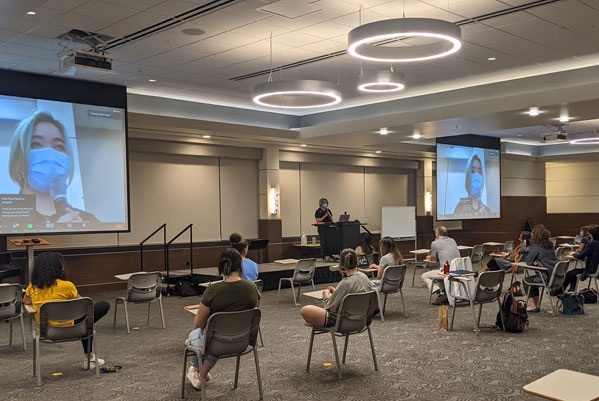President's Blog: From the Heart

One Family
By Eric F. Spina
As a child, Emily Parker said she “looked at the world in an innocent way,” not seeing any difference between herself and her adoptive family until second grade classmates told her she was different.
Her military family moved a dozen times, and she was often the only one of Asian descent in her class or on a team, but she didn’t feel overt prejudice.
Fast forward to last March when a white man refused to sit next to her on an airplane during her flight home at the start of the pandemic. Later, she stopped at a local Dollar Tree store to buy some snacks. Two white women followed her to her car and yelled racist slurs.
“They told me to go back to China,” she said, sadness in her voice. “My white family sees me for who I am — a daughter and a sister. My parents were infuriated. We sat around the dining room table and talked about what happened.”
That’s what we did this week, too, and it was vitally important for our UD community. In the midst of a surge in anti-Asian slurs, hate, and crime during the COVID-19 pandemic and the mass murder in Atlanta of mostly women of Asian descent, we gathered around the metaphoric table as a University family. More than 40 showed up in the Kennedy Union ballroom and another 160 connected via Zoom for “Hate is a Virus: A Dialogue on Racism Against Asians” that was sponsored by the Asian American Association (AAA).
Our students, faculty, and staff shared their stories with courage and vulnerability. I heard and felt fear, sadness, anger and, around their UD experience, a ray of hopefulness. Some of the speakers were American-born. Others were Asian immigrants. One student worried about her grandparents’ safety. A faculty member said he’s now hyper-vigilant when he takes his young son to a neighborhood park.
“We struggled with invisibility, and now we’re hyper visible. It took violence for people to recognize we exist as a community,” observed librarian and faculty member Ione Damasco, echoing a common refrain during the 90-minute dialogue. “There’s a perpetual otherness — a feeling that we’re not part of the American story. It’s been a lifetime of slights, subtle pushing away, and silence,” said Hsuan Tsen, senior lecturer in art and design. Echoed Marie Dock, AAA president, “I’m ethnically Chinese but I’m an American, and I’ve been made to feel like I didn’t belong.”
Marie and other students said they found a home at UD, anchored in their involvement in the relatively new, but very active, Asian American Association. During the dialogue, they heard support from their classmates. “I may not be Asian,” said Sierra Johnson, a junior criminal justice major, “but I’m an ally. You are loved, supported, and valued. I stand with you today, tomorrow — and every day.”
Beyond words of support, we must take action as a campus community. We can’t stand by in the face of this kind of bigotry and hate that is causing such pain and feelings of otherness by people we care for and love. This once again makes clear that our anti-racist plans and actions are critically important if we are to be an inclusive community where every Flyer feels safe and at home.
As I left the ballroom, Emily Parker’s words lingered in the air. “When one family member is hurting, it’s important to recognize that. We’re all part of this huge family.”
